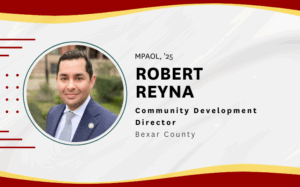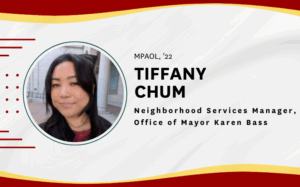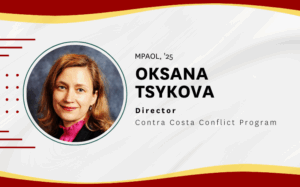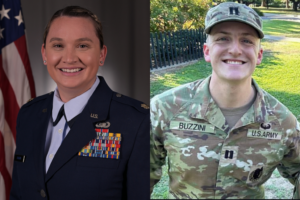T’Ante Sims is a seasoned professional with over two decades of experience in higher education and nonprofits. Now enrolled in the USC Price Master of Public Administration Online program, T’Ante is preparing to step into a new chapter of leadership—one shaped by legacy, passion for service, and a commitment to transformation. He shares what motivated him to pursue this degree, his experience in the program, and his aspirations for the future.
Q: What motivated you to pursue your Master’s Degree in Public Administration?
A: I’ve always had a passion for getting my master’s—it’s been a long time coming. At first, I thought about getting an MBA, then that progressed to an MFT. But after many years of working in the public sector, I realized all my skill sets really aligned with a master’s in public administration.
This journey is also personal. My father served 24 years in the Air Force. My grandparents were educators. My mother was a trailblazer—she integrated schools during the civil rights movement. For me, this is about continuing a legacy and giving back to make communities better.
Q: Can you tell us about your previous experience in public service?
A: I’ve been working in the public sector for about 22 years—18 of those in higher education within the CSU system, and four years prior to that in nonprofit, hosting events for the City of Sacramento. All of that experience helped me hone in on the decision to pursue this degree at USC Price.
Q: How did you hear about USC Price’s Online MPA programs, and what drew you to it?
A: Years ago, when I worked in athletics at Sacramento State, a donor saw something in me that I didn’t even see in myself. I was younger then, and didn’t think I was ready. But that moment stuck with me.
Since then, I knew I wanted to be a Trojan. I wanted a program that aligned with my values, and the USC Price program stood out. The flexibility of the online modality really appealed to me as a working professional. And knowing it was top-ranked in the country just solidified it—it felt like the right place to grow.
Q: What are some professional development goals for the program and beyond?
A: One of my main goals is to strengthen my skills as a leader. I’ve always been strong at working with people and collaborating, but I wanted to improve my technical skills—especially understanding how government works at the state, local, and federal levels, and how public and private institutions interact.
After the program, I’d love to move into consulting. I think it’s a great opportunity to stay connected to the community while sharing my experience and leadership to help public entities move forward. I also want to be part of the next generation of innovative, ethical leaders, especially as many baby boomers begin to retire. There’s a wave of opportunity coming, and I want to be ready for it.
Q: Have you learned any skills that you think will apply to consultant jobs?
A: One of the main things I’ve learned is the importance of asking “so what?”—always digging into how a problem connects to broader solutions. A class that really stood out to me was Organizational Behavior with Dr. Rawlings. We learned about motivational theories, and that really helped me as a leader—to think about how to motivate and inspire others. I want my leadership to be servant-based, compassionate, and innovative, and that class really gave me some tools to do that.
Q: Can you tell us about your experience in the program so far, for both the flexibility of online learning and in-person residencies?
A: It’s been great. As someone who hadn’t been in school in over 20 years, the online modality made it possible for me to balance work, life, and school. I’ve been able to use weekends to complete assignments, and I’m grateful for that flexibility.
The group projects have been very collaborative. And attending the in-person residency was a highlight—getting to meet my professors and classmates face-to-face helped us build deeper connections, which made working together online much smoother.
Q: How have you managed the balance between school, work, and life? What is your work life balance advice?
A: That’s definitely been one of the biggest challenges. I had to make a commitment—not just to myself, but to my family. There were times I knew I’d be pulled away. Having weekends for coursework helped, but I also made sure to have cut-off times so I could spend time with family and friends.
The faculty and classmates have been really supportive. We try to help each other maintain balance, and that’s been one of the major benefits of this program.
Q: What’s your interaction been like with professors?
A: The interactions with my professors have been great. They’ve set aside time—after class, during office hours, one-on-one—to answer questions and meet with us. They come with a great wealth of experience and professional knowledge that has really helped me. As I try to explore and venture out into consulting, they’ve set aside time to talk with me more about that, and I really appreciate it.
Q: And how has the experience been with your classmates?
A: The residency helped a lot with that. It gave us the chance to build relationships and see who we’d be working with throughout the program. Since then, we’ve kept in touch through a group chat—people are always stepping up to answer questions or offer help. We have classmates all over the country and they’ve just been a great help and very supportive.
Q: What does being part of the Trojan network mean to you?
A: The Trojan network has always been something I admired—even as a kid watching USC football. Being a part of the Trojan network is not just local, it’s global. Seeing how empowered people are about being a USC Trojan, that is something that has always stuck with me all throughout my life. I’m very privileged. I’m very grateful to be able to be a student here and to be able to call myself a Trojan.
Q: Is there a project you’ve done that you’re especially proud of?
A: One that stands out was a recent assignment where we created a recovery plan for the LA wildfires. That project really inspired me. You sit back and you see so many people volunteering and fundraising, and this was my way to be solutions-oriented—bringing strategy to real-world challenges. It really took a lot of time, but it gave me experience I know I’ll use in the future.
Q: What are transferable skills that you’ll carry with you in your career? If you’ve already started applying and explain how?
A: I’ve always wanted to be a leader, and this program really taps into how to create transformational opportunities—not just for yourself, but for organizations and communities. I’ve learned how to think innovatively, how to build partnerships, and how to bridge gaps across different sectors of government.
Ethics is a big part of it, too. These are things I’ll carry with me as I work to solve problems and create impact.
Q: Would you recommend the MPAOL program to prospective students? What advice would you give them?
A: Yeah, I definitely would recommend the MBA program to any student who knows who they are. If you want to serve your community, this program will give you the tools. It’s not just about becoming a better collaborator—it’s about developing the technical expertise to understand how governments operate and how to lead effectively across sectors. If you see yourself as a problem solver and changemaker, this program is for you.

Master of Public Administration Online
Advance Vital Institutions
Advance your career and the institutions you serve with our exceptional MPA online.
Find Out More


